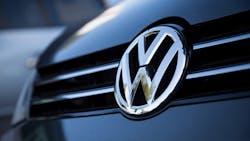Reports: VW Ignored Warnings on Illegal Cheat Software
BERLIN — Volkswagen ignored warnings years ago from staff and a supplier that the emission test rigging software that sparked the company’s worst scandal was illegal, German media reports said Sunday.
German authorities heaped pressure on the embattled corporate titan, demanding it set out a timeline by Oct. 7 on how it will ensure its diesel cars meet national emission standards without using the cheat technology.
VW sparked global outrage when it admitted that 11 million of its diesel cars are fitted with so-called defeat devices that activate pollution controls during tests but covertly turn them off when the car is on the road. The spiraling scandal has badly tarnished VW’s name, left it exposed to up to $18 billion in U.S. fines, and wiped out a third of its stock market value in a week.
On Friday, the VW board tapped company insider Matthias Mueller — chief of its luxury sports car brand Porsche — to steer the world’s largest automaker out of the wreckage. Mueller, 62, who replaces Martin Winterkorn as CEO, pledged in a letter to the company’s 600,000 staff “an unsparing investigation” as VW faces “an unprecedented challenge,” the Handelsblatt daily reported Sunday.
But an internal probe has already unearthed more troubling news for the German auto giant, as it faces the risk of judicial penalties and class action lawsuits, according to newspaper reports.
Bild am Sonntag said auto parts supplier Bosch, which produced the device, had warned the VW Group as early as 2007 that it was meant for test use only and that using it on the road would be illegal. A Bosch spokesman declined comment, citing a confidentiality agreement with its business partner.
According to the Frankfurter Allgemeine Sonntagszeitung (FAS), a VW employee had also sounded the alarm in 2011, warning that the software may spell an “infringement” of the law.
According to the article headlined “What did Winterkorn know?” and citing unnamed VW supervisory board sources, the internal probe had so far failed to discover why that warning was not acted on by management.
‘We are Working at Full Throttle’
Meanwhile, VW came under pressure at home to quickly outline how it will fix the problem, which affects 2.8 million cars sold in Germany.
The federal motor vehicle office (KBA) told Volkswagen to set out “binding measures and a timetable” by Oct. 7 on how it will meet emissions standards without resorting to software that rigs test results, Bild am Sonntag reported.
If Volkswagen fails to comply, the KBA warned it could withdraw approval for the affected models, meaning they could no longer be sold or even moved on German roads.
A VW spokesman told AFP the company would soon present an action plan in Germany and “announce when we expect to launch a recall,” adding that “we are working at full throttle.”
The software would be updated free of charge “so that it conforms with the law,” spokesman Peter Thul said, adding, “If we need to do more ... we will.”
Leading newspapers asked questions about the degree to which the German government has shielded the crucial auto sector against tougher emission rules.
“There is close cooperation between the auto industry, politics and the bureaucracy,” said Juergen Resch, head of the group German Environmental Aid, in Die Welt am Sonntag.
The newspaper also said Berlin had sought to delay the introduction of stricter EU emission tests planned for late 2017 to 2021, citing an internal position paper.
Exposure to Fine Particles, and a Scandal
Winfried Hermann, Baden-Wuerttemberg state transport minister of the Greens party, charged that “the federal government should long ago have pursued evidence of manipulation in the engine controls and taken a closer look.”
His state government had long wondered, he said, “Why exposure to fine particles and nitrogen oxides had far exceeded limits in the greater Stuttgart area, even though the cars were supposedly getting better and better.”
VW has suffered its biggest crisis in the same year it had reached its long-time goal — overtaking Japan’s Toyota as the world’s top car maker by sales. Since the emission revelations, it has been hit by a cascade of bad news.
In the United States. VW has stopped the sale of new diesel cars, while Switzerland has ordered a temporary halt to such sales. India and Mexico have opened fraud probes, and France and Great Britain have also announced new checks.
UniCredit chief economist Erik Nielsen said that since the auto sector accounts for 10% of the German economy, the VW scandal could, “depending on the political and corporate responses ... damage the overall reputation of German engineering.”
The chief of German luxury auto giant Daimler, Dieter Zetsche, told the FAS about the German car sector that “I hope the damage isn’t permanent.”
By Frank Zeller
Copyright Agence France-Presse, 2015
About the Author
Agence France-Presse
Copyright Agence France-Presse, 2002-2025. AFP text, photos, graphics and logos shall not be reproduced, published, broadcast, rewritten for broadcast or publication or redistributed directly or indirectly in any medium. AFP shall not be held liable for any delays, inaccuracies, errors or omissions in any AFP content, or for any actions taken in consequence.
